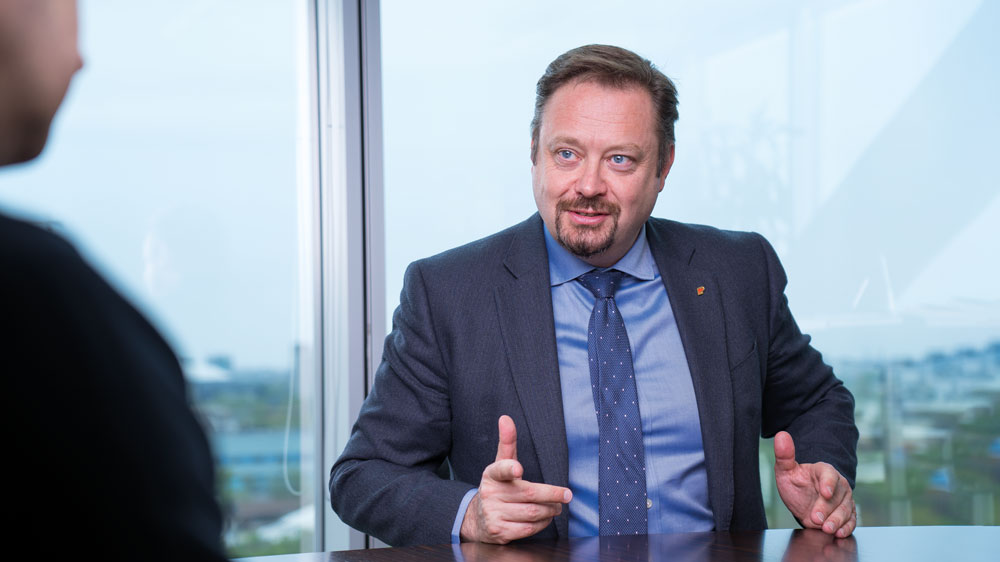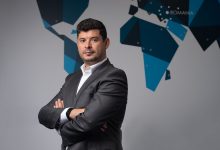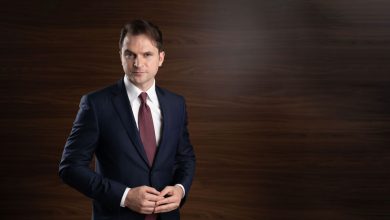Franck Neel: Focus on security of supply and cleaner energy at affordable prices
OMV Petrom is the largest energy group in South Eastern Europe. The company is active in Upstream, but it is also an important player in the regional fuels, gas and power markets. OMV Petrom is a reliable energy supplier for businesses, providing customized gas and power solutions to over 450 Romanian companies.
The company is active on the entire gas value chain in Romania, from production and processing, to marketing and supply. OMV Petrom’s gas production can cover approximately 40% of Romania’s gas demand. OMV Petrom is also active on the power market in Romania, both as a power producer and as a supplier.
Franck Neel – Member of the Executive Board, Downstream Gas Division at OMV Petrom, discusses the role of gas in solving the current challenges – increased energy demand and climate change, the most pressing issues in the gas sector in Europe and Romania and Downstream Gas Division’s main objectives for the upcoming years.
Dear Mr. Neel, you have extensive international experience – more than 25 years in the energy field. How do you see the European energy market? How do you assess Romania’s place in this scenery?
Franck Neel: Let me start by saying the energy market is an exciting field to operate in, providing an essential ingredient to human life and development, but definitely not without its challenges.
From climate change, to security of supply, to a variety of geopolitical aspects playing an important role, to technology supporting meaningful transformation, the industry is reshaping itself constantly to address the current concerns.
Right now, in both Europe and Romania, the focus is on security of supply and providing cleaner energy at affordable prices. While Europe works towards this goal by diversifying energy supply sources and building efficient energy market mechanisms, Romania needs to follow along that same path, taking steps towards achieving meaningful interconnection, encouraging investments and taking steps towards liberalized gas and electricity markets.
Due to own hydrocarbons reserves and a balanced mix of energy sources, Romania has one of the lowest energy dependency rates in Europe. Moreover, the discoveries made in the Black Sea have the potential to secure Romania’s energy independency and to establish the country as a regional key player on the gas market. To turn this potential into reality, large investments are required, thus creating new jobs and bringing additional revenues to the state budget.
Climate change is also a topic of utmost importance that is being addressed by European Governments and Romania needs to take an active role in these discussions. Within this context, natural gas is the energy carrier of the future, due to lower carbon emissions, affordability, capacity of being stored and availability. In Romania, natural gas is the most important primary energy sources, representing 31% of the primary energy production. This fact should set the scene for encouraging investments in gas projects and for putting in place the right infrastructure.
We see that OMV Petrom grew its sales revenue in 2018. What role did the Downstream Gas Division play in this regard? What is your outlook for the remainder of the year?
Franck Neel: Downstream Gas Division in OMV Petrom, that ensures electricity production and gas & power sales, contributed significantly to the company’s results in 2018, with approximately 22% share in its consolidated sales totalling RON 22 bn.
Our integrated business model allowed us to capture market opportunities along the entire value chain.
We successfully placed on the market our entire equity gas production, supplying a variety of customers, both large industrial players in Romania but also an increasing number of small and medium enterprises. Furthermore, the Downstream Gas 2018 result reflects improved performance of the power business, enabled by better market conditions and full availability of the Brazi power plant in the fourth quarter 2018. The Brazi plant generated a record high production in 2018, thus contributing significantly to Romania’s security of power supply in the context of a colder winter, with higher power consumption and lower production levels.
Recently we announced the results for the first quarter of 2019 and again our division has a strong contribution. Our performance over the period included an increased net electrical output of over 1 TWh. The gas sales volume decreased by 14% due to decreasing equity gas production and lower gas volumes available in storage.
For 2019, we expect demand for gas and power to remain similar to 2018.
A new energy report reveals European Union’s growing need for gas imports – its own production is declining, around 100bcm of long-term contracts expire by 2025. IEA estimates that the EU will have to seek additional imports by 2025 to cover up to one-third of its anticipated consumption. What are OMV Petrom’s plans regarding this situation?
Franck Neel: Romania has a unique strength in Europe that is in the same time a huge opportunity for the country – natural gas resources. Still, Romanian natural gas production is declining, due to the natural process of depleting gas fields. As such, in the absence of new gas discoveries being brought on-stream, Romania will become increasingly dependent on import gas. Investments are required in order to mitigate the natural decline in Romania, however investors need predictability and stability, especially in a long investments cycle industry.
Moreover, I would mention also here the Neptun Deep project, the opportunity Romania should benefit from on the long term. The Neptun Deep project is a huge opportunity for Romania: to increase revenues to the state budget, create new jobs, secure Romania’s gas needs. Usually, for such large-scale projects, many pieces of the puzzle need to be aligned: such as regulatory framework, fiscal stability, competitive terms, liberalized gas market and key infrastructure.
The intensively debated GEO 114/2018 has sparked a number of controversies and expressions of opinion by companies affected by this ordinance. What are its most important consequences for the activity you carry out?
Franck Neel: When GEO 114/2018 was made public at the end of 2018, it was very clear that we face substantial, structural shift in the Romanian energy market. After a long, fairly-complex and not without delays gas market liberalization process, and after barely two years of liberalized gas market, we went back to a regulated status.
We understand the approach to protect vulnerable consumers and have expressed our openness to finding solutions. Amendments brought to the Ordinance answer some of the concerns expressed by the oil & gas industry. Returning to unregulated gas prices for industrial customers represents an important step towards a liberalized gas market. We believe a liberalized gas market can exist with the right mechanisms in place to protect vulnerable customers, in accordance with the existing good European practice.
This process should continue. We believe that dialogue can get us closer to a solution and this dialogue must continue. Consultation with the business environment, predictability and legislative and fiscal stability are the foundation for stimulating investment.
Our assessment accounts for a net impact on our 2019 Operating Result of around 40 million EUR.
OMV Petrom has announced that due to the unstable fiscal environment the investment activities would focus in 2019 on oil producing fields and not on gas fields, resulting in a lower investment level compared to last year. What will this level be, precisely?
Franck Neel: OMV Petrom is a high scale investor and we are committed to Romania. However, in the recent period, we have seen high fiscal and legislative volatility and this made us to revisit our investments plans. Our investments are still at a high level, with RON 3.7 bn estimated for 2019, with 75% supporting upstream projects. This is probably the largest budget in the energy sector.
From your viewpoint, what are the most pressing issues in the gas sector in Europe and Romania today?
Franck Neel: With global population growth, more and more energy is needed to improve lives and living standards, and this stands true for Romania. It is hard to imagine modern life without gas for heating homes, without fuels for cars, without electricity for phones or computers. Our role, as an energy company, is to cover this demand, while lowering costs and reducing the impact on the environment. We are active on all these activities in the energy value chain.
The main challenges of our industry are to adapt our business models to low-carbon energy generation, and to ensure access to affordable energy sources.
From a Romanian perspective, the country should focus on ensuring its energy security, through a variety of means, reshaping the central market obligation that has not delivered the incentives for investments and market liquidities, working towards a modern transportation system and building systems to facilitate resource interconnection. A well-functioning market with interconnection will attract producers, suppliers and traders which will generate the right signals for investments and market prices for commodities as we can see in many countries. It is also important to put in place a vulnerable customer scheme to protect low-income customers.
However, these developments would require significant investments and these cannot happen without a coherent, predictable and stable regulatory environment based on thorough stakeholder consultation.
International energy markets are going through an extensive transition process, which takes place at technological, geopolitical, economic level and at the level of climate change. How do you see the role of gas in solving the current challenges – increased energy demand and climate change?
Franck Neel: Gas is the energy of the future in a world that needs a climate friendly energy system. Gas is increasingly used in power generation, as it is the cleanest of fossil fuels, with 40% lower carbon emissions than coal, and considerably lower emissions of air pollutants. Also, due to the flexibility of gas-based power generation units, they are complementary to variable RES (wind and solar). Thus, on the road to decarbonization, natural gas has all the prerequisites for being the energy for the future, source of endless possibilities, capable to support the evolution of the energy system towards clean, decentralized and flexible production.
Gas has also a high potential to become an alternative fuel for transportation, as CNG (compressed natural gas) solutions can significantly reduce emissions.
Taking into account the aforementioned, what are in your opinion the priority directions that Romania’s investments should follow to facilitate this transition?
Franck Neel: In order to ensure Romania’s security of supply, there are several aspects that need to be considered.
The first one refers to investments. According to Romania’s energy strategy 2018-2030 the Romanian energy sector requires investments of EUR 25 bn by 2030. If we look to a longer perspective, respectively for the period 2030-2050, the same source indicates a need of investments in amount of EUR 15 bn. This should also target the domestic production.
The second one refers to interconnectivity – we need to see progress on projects like BRUA, interconnection of the NTS with the international gas transmission pipelines and reverse flow at Isaccea. Currently Romania has an interconnection capacity of 7% and estimates a 9% target to be achieved by 2020. The target for 2030 is 15% and we support it.
The development of the natural gas market depends to a large extent on the quality of energy policies, regulations and institutions. These should stimulate investments in domestic production and essential gas infrastructure (interconnectors, storage deposits, transport and distribution system). Also, the reduction of GHG emissions should be considered.
In creating a better, environmentally sustainable industry, what do you think the way is? How government regulations could be more streamlined but not infringe upon industry competitiveness?
Franck Neel: The government regulations set the tone for our industry, and not only, of course: market design, fundamentals and rules of the game are following the regulatory framework. As mentioned, there is still a long path ahead of us until reaching a mature and attractive energy market in Romania as several disfunctions are still opposing: limited interconnections to EU gas markets, wholesale market low liquidity, inadequate protection of vulnerable consumers and some others.
However, the good news is that there are solutions to all these problems, solutions that proved efficient in other countries facing the same hurdles, it is a matter of joint commitment to implement them. Just to give some examples: implementation of an efficient scheme to protect the vulnerable energy consumers, combining financial, non-financial and energy efficiency measures; the full cancellation of the price cap, transparent household regulated price that can give visibility for competition on retail and freedom of bilateral contracts with defined terms, enabling new product generation for customers; reshape of the central market obligation to create more liquidity and price signal; interconnection development etc.
Environmentally responsible corporate behaviour is definitely a way to give back to society. Now that the oil and gas industry is increasingly looking for greener solutions, where can OMV Petrom add value?
Franck Neel: There are a number of initiatives that promote environmentally responsible corporate behaviour in the energy industry, both coming from major players but also from promising, innovative start-ups. OMV Petrom has a long tradition of sustainable and responsible behaviour. We see natural gas as part of the solution for cleaner and sustainable access to energy. We conduct our business in a responsible way, respecting the environment and adding value to the communities in which we operate. We support the transition to lower-carbon energy sources and are continuously working on the introduction of innovative technologies and digital solutions to reduce the environmental impact of our activities.
For example, the feedstock recovery pilot project at the Schwechat refinery uses plastic waste to produce synthetic crude in a pyrolysis process. This recycled crude can be processed into any desired refinery product, while reducing the dependence on fossil resources and improving carbon intensity. While a number of technological challenges needed to be overcome, currently, at Schwechat, this new ReOil unit can process up to 100 kilograms of waste per hour, thus producing 100 litres of valuable crude.
What are the Downstream Gas Division’s main objectives and vision in the coming years?
Franck Neel: OMV Petrom is committed to maintaining and strengthening its position as a leading integrated energy player in the region. Thus, our focus is on the opportunities that Romania offers, complemented by selective regional investments, while, at the same time, enhancing customer experience by offering high quality products and services.
In Downstream Gas, we have taken steps to increase both the competitiveness in our product portfolio and contribution from end customers, towards achieving the long-term strategic goal of consolidating our leading position in the Romanian gas market.
Regarding the strategic direction of Downstream Gas to become a regional player, activities have started for creating an entry into neighbouring gas markets. As the Neptun Deep project will come on stream, subject to the confirmation of commercial viability, regional expansion will become an important element of monetizing gas from the offshore Black Sea.
Where would you like to see OMV Petrom positioned, let’s say, five years from now?
Franck Neel: In five years, I see OMV Petrom fully delivering on our strategy of providing sustainable access to energy for everyday modern life.







